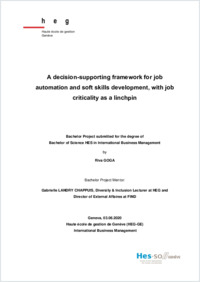A decision-supporting framework for job automation and soft skills development, with job criticality as a linchpin
SONAR|HES-SO
-
2020
88 p.
Mémoire de bachelor: Haute école de gestion de Genève, 2020 (jury note: Landry Chappuis, Gabrielle)
English
The Fourth Industrial Revolution represents both challenges and opportunities for companies, but more importantly, it raises questions about what decisions should be made and what their implications would be. There are two dimensions to this new era of economic disruption that can be seen as opposed or complementary: job automation and soft skill development for humans. Often, discussing these topics is uncomfortable for business actors, because it implies that many people will find themselves unemployed given that machines might replace a good portion of the human workforce. However, multiple studies have demonstrated that machines could relieve humans from their monotonous and repetitive tasks, allowing them to focus on higher value ones, thus enhancing their work experience. In this context, the objective of this thesis is to construct a decision-supporting framework to help companies determine the best actions to take to fully optimize their resources and capital given the level of potential job automation available by the technological advancement at a particular point in time and the nature of the jobs within the company. The framework draws its concept and rationale from secondary data sources, and its validity as an analytical tool stems from in-depth interviews conducted with field professionals who have been exposed to such decisions. The expected outcome is that the framework will be used by companies to assess whether they should invest more in people, machines, or both. Furthermore, it will allow companies to quickly visualize and capture these elements in one place, thus helping in the decision-making process. Companies could use the job automation and soft skills framework on a quarterly or yearly basis, based on their needs and the pace of technology assessment in their sector, to assess their current situation and project their future needs. Although the future can never be known in advance, any planning is better than no planning.
- Language
-
- English
- Classification
- Economics
- Notes
-
- Haute école de gestion Genève
- International Business Management
- hesso:hegge
- License
- License undefined
- Identifiers
-
- RERO DOC 329843
- Persistent URL
- https://folia.unifr.ch/global/documents/315022
Statistics
Document views: 127
File downloads:
- TBIBM_2020_GOGA_Riva.pdf: 204
